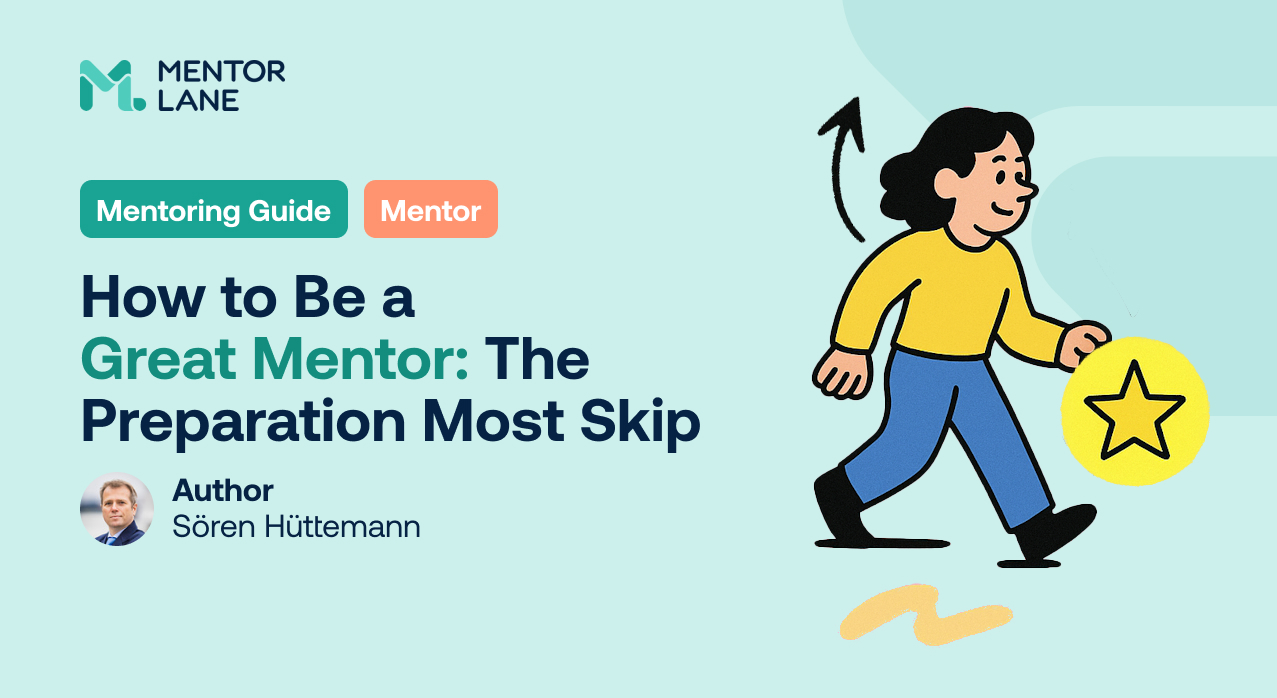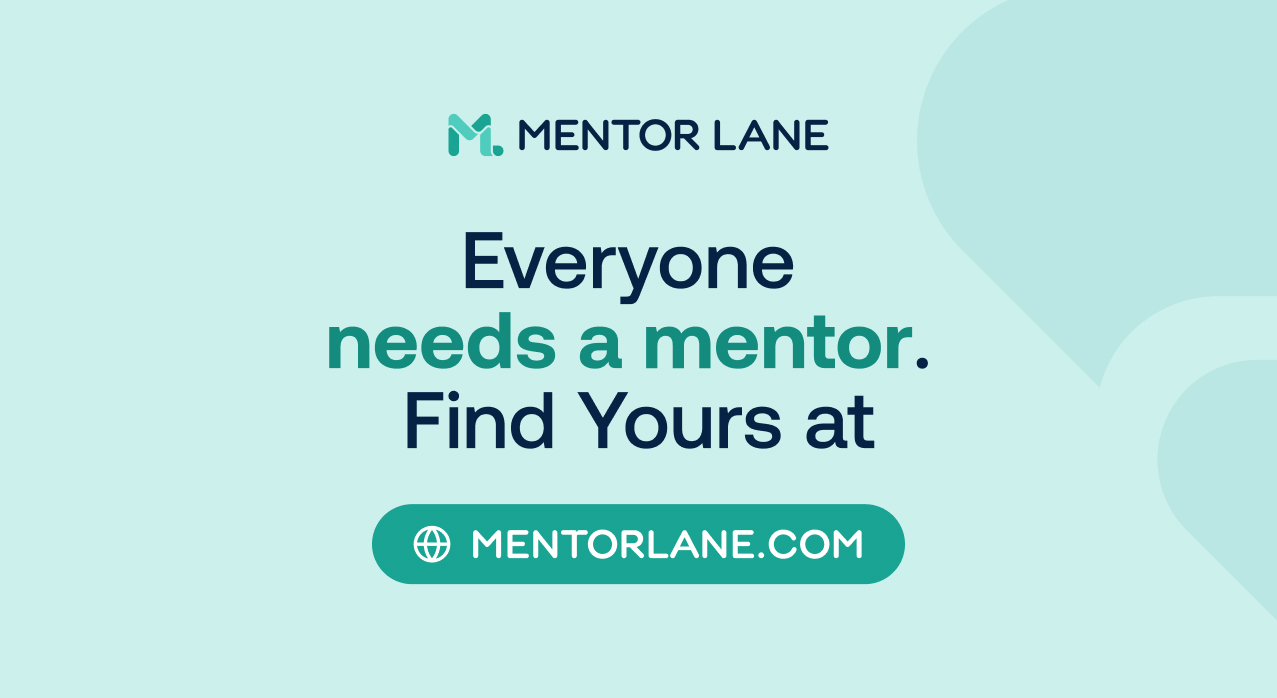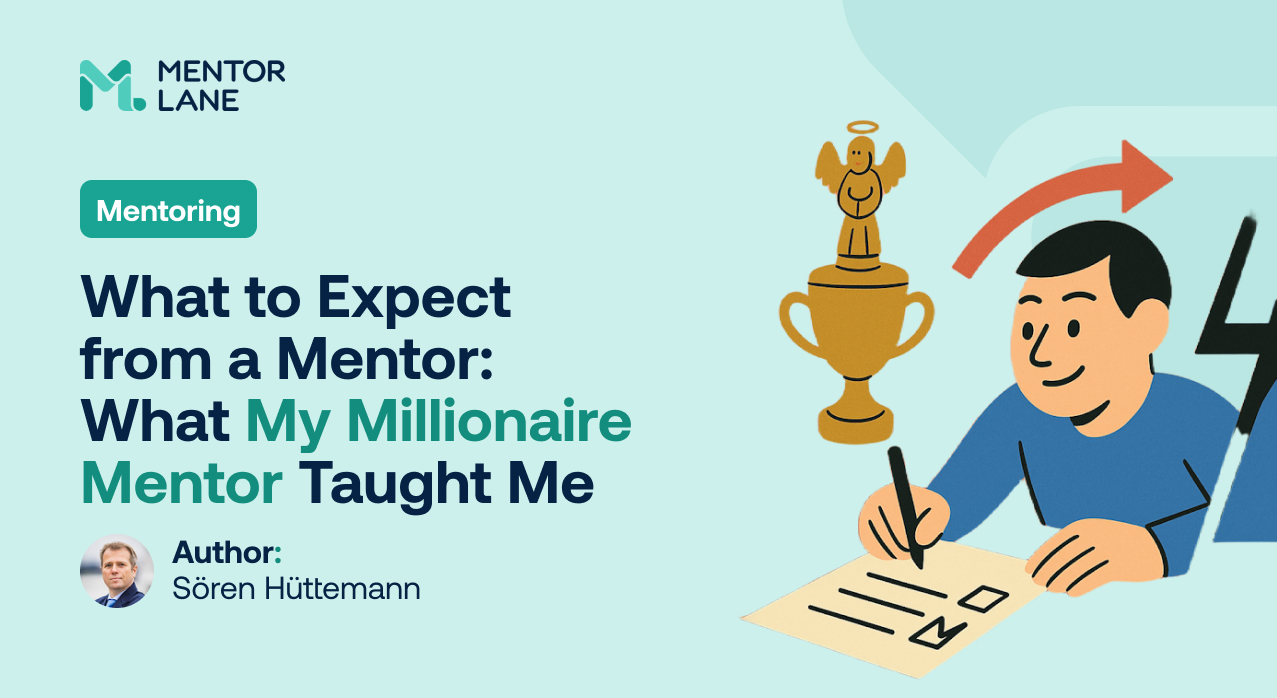News & Updates
22 Aug 07:40
7 min read
How to Be a Great Mentor: The Preparation Most Skip
Discover what makes a great mentor from self-reflection to fostering growth. This preparation strategy separates great mentors from average ones.

Courtney Ellis
Media Manager

How to Be a Great Mentor: The Preparation Most Skip
Download Here - Preparation Guide For Mentors.pdf
You know that moment when someone asks if you’d be up for mentoring them, and before your brain’s even clocked in, your heart’s already shouting, “Absolutely!”
That urge to support others is great, but it only turns into something truly rewarding if you do it right.
Being a great mentor isn’t just about flexing your experience. A huge amount of inner work is required first. The mentors who actually make a difference? They’re not just walking CVs they’re effective mentors who’ve looked in the mirror and asked, “Why am I really doing this?”
If you’re feeling called to mentor, let’s talk about how to prepare in a way that sets both you and your mentee up for genuine transformation and helps your mentee succeed.
Start With Your “Why” – Then Peel That Onion
Most people jump into mentoring with surface-level motivations: “I want to help others” or “I want to give back.” These are great sentiments but won’t sustain you through challenging conversations or help you connect authentically in your mentoring relationship.
The most effective way to approach this is to treat your motivation like an onion. Peel it. Cry a little. Get to the core.
Layer 1 (Your Surface Reason):
Maybe it’s “I want to develop the next generation of leaders.”
Layer 2 (What’s Beneath That):
Perhaps it’s “I feel responsible for sharing what I’ve learnt so the company doesn’t lose this knowledge.”
Layer 3 (The Core Truth):
Could be “I’m passionate about a specific area where I have unique expertise, and seeing others grow in this space energises me.”
As one experienced mentor shared: “I thought I was mentoring to give back, but I realised I was actually seeking opportunities to grow my own leadership skills. Once I acknowledged that, I became a much more effective mentor.”
Your deeper motivations aren’t selfish they’re human. When you define these core drivers and are honest about them, you show up more genuinely in the mentor and mentee relationship. This understanding becomes the foundation for your mentorship program and helps establish clear expectations from the start.
Your Life Story is Your Superpower
Before you can provide guidance on someone else’s journey, you need to understand your own. This isn’t about creating a perfect success story it’s about recognising the experiences that shaped you and how they might influence your mentoring skills.Take half-an-hour and map out your professional journey. Mark all the major turning points: promotions, flops, lucky breaks, deep doubts. Then ask yourself:
- What stood in your way, and how did you get past it?
- Who supported you, and what made them effective?
- What “unexpected events” changed your trajectory?
- What lessons still echo in your head?
Why does this matter? Because we all carry bias. If you don’t know yours, you’ll end up mentoring people like they’re just a mini-you. And that’s not mentoring. That’s cloning.
One mentor realised she was all about independent thinking. So she kept telling her mentee to “figure it out.” But what he actually needed was help building his network and accessing networking opportunities. Understanding diverse perspectives, she adjusted her approach and watched her mentee develop into a confident “unique” professional.
Your career story, including both challenges and success, becomes a powerful resource that helps you better understand what your mentees might face and how to provide meaningful support.
Master the Art of Deep Listening
If you ask mentees what they value most in their mentors, “being a good listener” is always top of the list. But being a good listener does not require the typical meeting-room, nod-and-smile approach.
Successful mentors hear the silence. They read body language and can catch a shift in energy. They spot the dream hiding behind the spreadsheet. They actively listen for what’s not being said.
Here’s a simple way to practise: In your next conversation with anyone, spend more time listening to their body language and emotions than to their words. What are they really asking for? What are they afraid to say? This skill will transform every mentoring conversation you have and help you become the sounding board your mentee needs.
When you actively listen, you create a safety net where your mentees can explore their ideas, discuss their challenges and build confidence in their own problem solving skills.
Don’t Be the Answer Machine
This might be the hardest part for high-achieving professionals: Your job as a mentor isn’t to solve your mentee’s problems. It’s to support them in finding their own solutions and developing their independent thinking.
When your mentee comes to you with a challenge, resist the urge to jump straight into advice mode. Instead, try these approaches:
- “What have you considered so far?”
- “What would success look like in this situation?”
- “What’s making this decision particularly difficult?”* “If you weren’t worried about failing, what would you try?”
You’re not the problem-solver. You’re the co-pilot. You’re helping them develop their own decision-making muscles and problem-solving skills, not flexing yours. Let them drive while you provide guidance and encourage them to explore different options.
This way you build trust and give your mentee the responsibility to lead their own development, while you serve as their guide and source of insight.
Setting the Foundation: Ground Rules and Open Communication
Before you start mentoring, set clear ground rules with your mentee. Don’t create rigid boundaries but establish a framework for open communication that benefits both you and your mentee.
Discuss:
- Meeting frequency and communication methods
- Career goals and focus areas for development
- How you’ll provide feedback and measure progress
- Scope of your guidance and available resources
- Confidentiality and trust within your mentoring relationship
Having these conversations early helps define the mentee-mentor relationship and ensures both parties know their roles.
It opens up for honest conversations about challenges, motivation and personal development goals.
The Learning Lab
The most powerful mentoring relationships become learning laboratories where both people grow. When you approach mentoring with genuine curiosity about your mentee’s perspective, background and challenges, real growth happens.
- Maybe they’re navigating workplace dynamics you never faced.
- Perhaps they’re from a different generation with fresh approaches to work-life integration.
- They might have technical skills that complement your strategic thinking.
- Or cultural insights that broaden your worldview and bring diverse perspectives to your team.
This mutual learning approach turns traditional mentoring into something richer - a relationship where both mentor and mentee benefit from shared knowledge, expertise and different life experiences.
Developing Mentoring Skills
Great mentors don’t just rely on their career experience - they develop specific mentoring skills that help them communicate better and provide more support.
Communication:
Learn to ask powerful questions that prompt reflection and insight. Practice giving feedback that motivates rather than demotivates.
Understanding and Empathy:
Develop your ability to see things from your mentee’s perspective. This helps you provide more relevant guidance and advice.
Patience and Encouragement:
Remember development takes time. Your role is to encourage exploration and learning, not to rush your mentee to quick fixes.
- *Resources:**Build knowledge of training opportunities, networking events and other resources that can support your mentee’s growth and help them achieve their career goals.
The best mentors understand that advising isn’t just about sharing what they know - it’s about helping their mentees discover their own strengths, overcome challenges and build the confidence to lead their own professional journey.
The Ripple Effect of Intentional Mentoring
Mentoring doesn’t just impact one person. People who have been successfully mentored are more likely to become thoughtful mentors themselves. They carry forward not just what you taught them, but how you taught them. This positive change is a powerful tool that can spread through organisations and industries.
When you develop both the person and their professional skills you’re contributing to a cycle of growth that extends far beyond your immediate mentoring relationship. Your mentee may go on to lead teams, start companies or mentor others using the insights and approaches they learned from you.
Your Journey as a Mentor Starts Here
The people who become truly great mentors aren’t the ones who have it all figured out - they’re the ones willing to do the inner work, learn and show up with both wisdom and humility. They understand that the best mentoring relationships are built on a foundation of self awareness, genuine curiosity and the courage to grow alongside the people they’re guiding.
Your experience has value. Your insights matter. Your expertise can open doors for others. But your greatest gift as a mentor might just be your willingness to keep learning, keep reflecting and keep showing up as your authentic self.
Whether you’re just starting your mentoring journey or looking to enhance your existing mentoring skills remember being both a mentor and a continuous learner creates the most meaningful and impactful relationships.
Are you ready to start that journey?

This post is also available in:
Related Posts
Sales Mentors: A 9-Round Guide to Sales Success with Michael Silberberger
Discover Michael’s 9-round guide to sales success. Learn how sales mentors help you build confidence, resilience, and lasting results.
What to Expect from a Mentor: What My Millionaire Mentor Taught Me
Curious what a millionaire mentor actually teaches? It's not about money tricks, it's mindset. Discover the surprising lessons that transformed Michael's approach to success and life.
How To Become a Mentor in Germany
Ever thought about becoming a mentor? Click here to work out if you're ready to become a mentor, and the steps to take to become a mentor in Germany.



-cd972d86.png)
